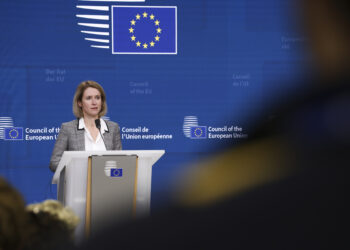Rome – The path leading to the second commission headed by Ursula von der Leyen was neither easy nor immune to “bitter” political controversy, but at the end of that path “I feel I can proudly say ‘mission accomplished.'” On the eve of the new Commission’s first European Council, Dec. 19 and 20, before the Italian Parliament Giorgia Meloni claims diplomatic work by the government has been a success for Rome: “An Italian has been appointed executive vice-president, a valuable politician esteemed in Italy and Europe,” she affirms, recalling that Raffaele Fitto has been entrusted with an “important” portfolio, worth a total of around €1 trillion, considering the cohesion policy funds of the 2021–2027 budget (around €400 million)—to which must be added those of the new programming to be defined by the Commission—and the Next Generation EU resources (around €600 million), a competence that Fitto will share with Commissioner Dombrovskis. However, Matteo Salvini’s Lega’s ranks are almost empty during communications in the House.
“Why is there almost no one there? Because we don’t give a f***. It happens like this when there is a budget session. Now they will come for the final vote,” one of the five Lega deputies in the House, Stefano Candiani, replied to Repubblica, pointing out that “some are late for the trains.” “The Lega will vote compactly and with conviction, as always, on the centre-right resolution to confirm full support for Giorgia Meloni,” the Lega hastened to announce in a note. She softens her tone in retort: “I was also late coming by car, and the mayor of Rome is not from the League…,” she says.
In front of Montecitorio, the Prime Minister reiterates that the executive vice presidency assigned to the Italian commissioner is not just an honorary title but a “concrete tool” to oversee and coordinate EU policies in strategic sectors such as agriculture, fishing, transport, tourism, the economy of the sea, and social housing, sectors in which “an Italian sensibility can certainly contribute to bringing the debate back to a pragmatic approach by overcoming that ideological and dogmatic drift that Brussels has shown in too many areas in recent years.” She recalls that Fitto is credited with ranking first in Europe regarding goals achieved and international financial advancement of the NRRP. Italy, she explains, is no longer isolated at the international level; on the contrary: “It is increasingly central in many dynamics and a protagonist in the new dialogue formats that are emerging in Europe to try to deal pragmatically and concretely with the many strategic dossiers we are discussing.”
Meloni looks to the future Trump administration, stressing that Europe’s approach must be “pragmatic,” but also “open,” to avoid trade clashes. She also returns to the Ue-Mercosur agreement signed by Von der Leyen, making it clear that Italy’s support will not be there unless precise guarantees are given to farmers. Support for Ukraine at the centre, with a commitment to continue to play its part also in strengthening sanctions on Russia: after the recent adoption of the fifteenth sanctions package, a sixteenth package is already being drafted. The executive is working on the reconstruction conference to be hosted in Italy on July 10 and 11, 2025, “an important event on which the government counts on the support of all political forces,” says the Prime Minister.
Rome’s attention also remains high on the Middle East. Italy is, Meloni recalls, “at the forefront of support for the Palestinian civilian population,” with an allocation of 70 million for crisis response and with the Food for Gaza initiative, for which two humanitarian flights of more than 100 tons of aid have departed. But the goal is not just immediate assistance, she assures, “Our goal going forward is to contribute to the stabilization and material and social reconstruction of the strip, and we must continue to work for the resumption of a credible political process; a just and sustainable peace in the region,” is the position, “can only be achieved through a two-state solution that guarantees both Israelis and Palestinians security and mutual recognition.
English version by the Translation Service of Withub






